Surpassing Gemini and ChatGPT! In-depth Research and Evaluation of Alibaba Qwen: Free, Citable, and Capable of Generating Real-time Web Alpha Information Sources with One Click
Alibaba's Qwen Deep Research Can Create Real-Time Webpages and Podcasts in Seconds
Alibaba's Qwen Deep Research now allows users to convert reports into real-time webpages and podcasts with a single click. Here’s how this free service compares to Gemini, ChatGPT, and Grok.
Brief Overview
- Alibaba has upgraded Qwen Deep Research, adding one-click webpage and podcast generation features.
- In testing, Qwen and Gemini tied in accuracy, both outperforming ChatGPT and Grok.
- Overall, Qwen wins in research depth and shareable webpage output, while Gemini leads in multimedia quality.
Alibaba’s dedicated AI research team, Qwen, released a major upgrade to its AI chatbot last week, enabling users to generate comprehensive research documents on any topic.
Afterward, with just a few clicks, you can easily convert these documents into clear webpages or multi-role podcasts.
Qwen Chat’s interface and user experience are similar to ChatGPT, DeepSeek, or Claude, and it is available globally for free.
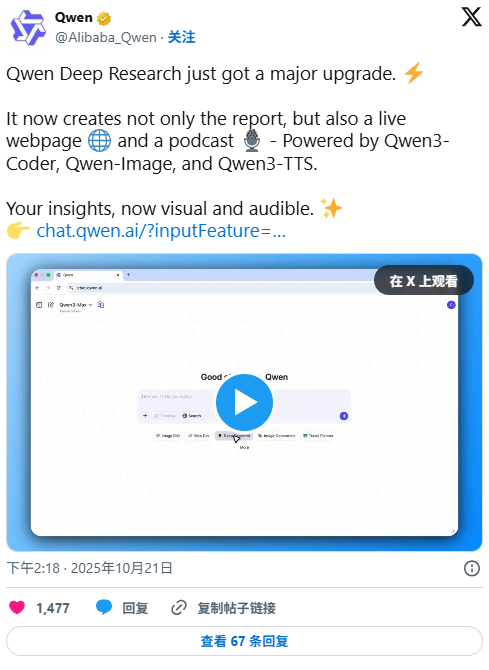
The new features are powered by three open-source models working in tandem: Qwen3-Coder parses webpage structure, Qwen-Image generates embedded charts, and Qwen3-TTS drives dynamic voice narration.
Despite relying on open-source models, the end-to-end experience—including research execution, webpage deployment, and audio generation—is operated by Qwen as a managed service.
The workflow starts in the Qwen Chat interface, where users pose research questions. After initial clarification, the AI performs web searches, analyzes public data sources, and ultimately generates a complete report with citations.
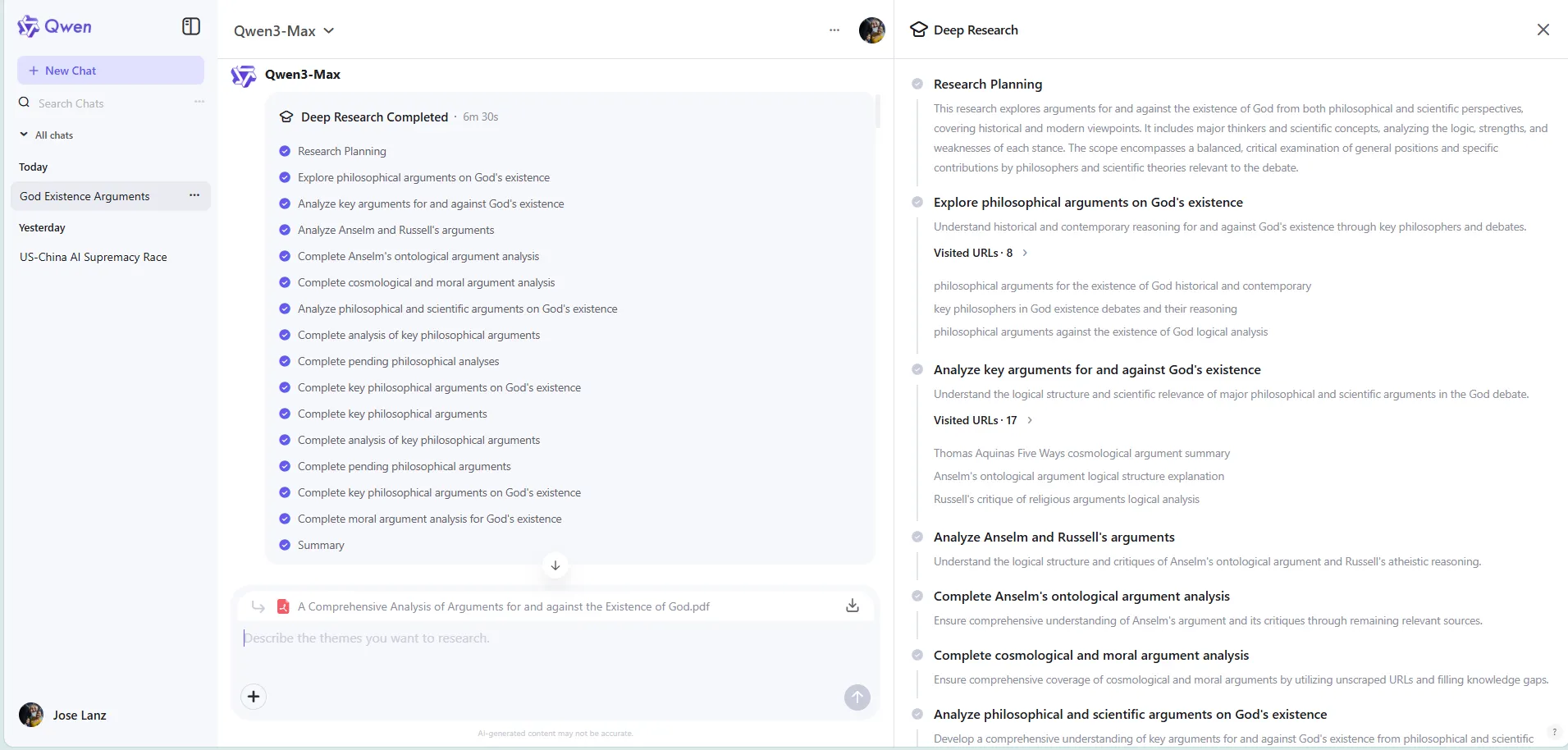
Two new options then appear: “Webpage Development” automatically generates a professional-grade dynamic webpage, deployed and hosted by Qwen, including embedded charts.
The “Podcast” option provides an audio discussion with dynamic multi-role narration, offering 17 anchor voices and 7 co-anchor tones to choose from.
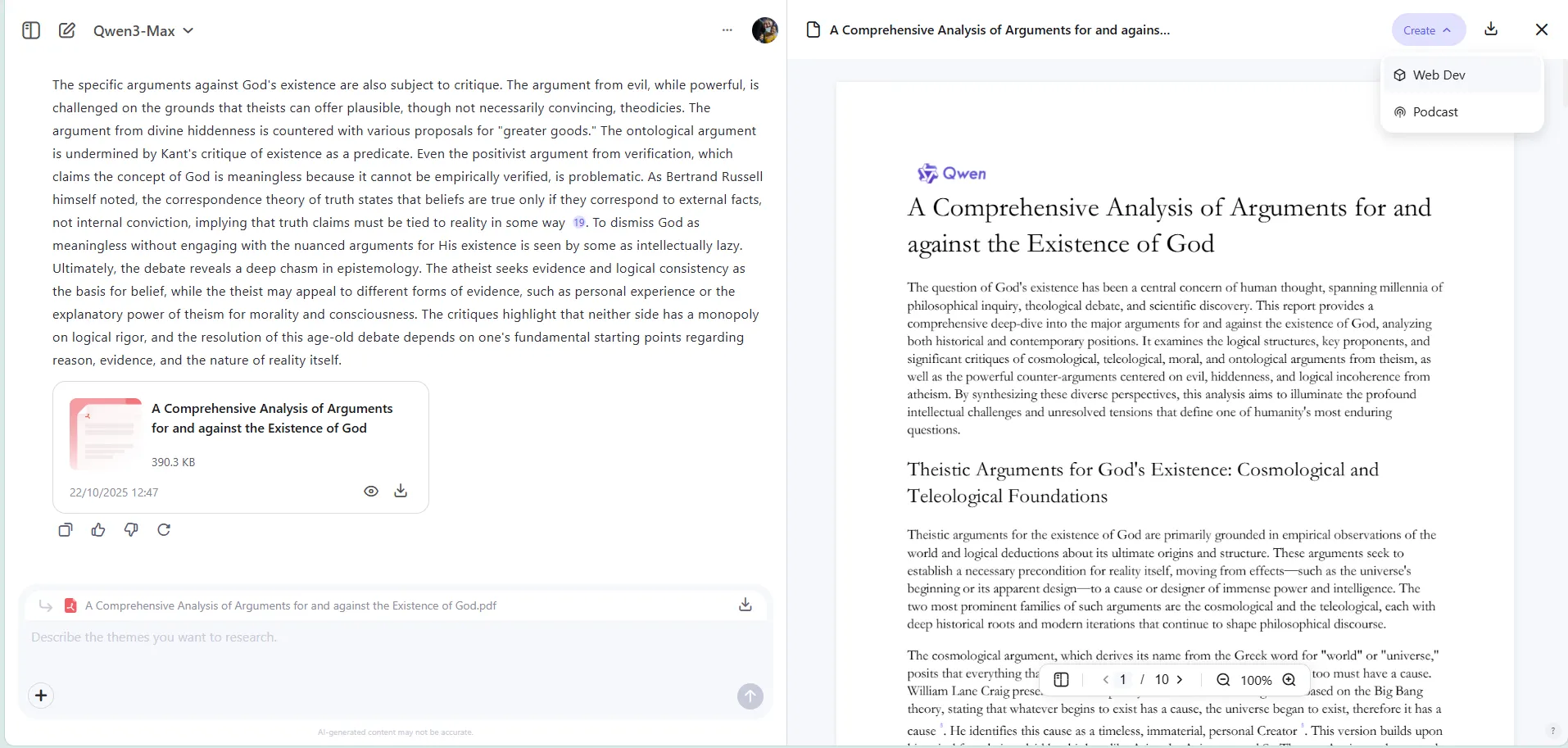
Model Testing Phase
To evaluate Qwen’s performance as a research tool, we ran the same complex research query on Qwen, Gemini, ChatGPT, and Grok. The task required analyzing philosophical and scientific arguments regarding the existence of God (details available via GitHub repository), with each model generating a complete research report. Evaluation included five criteria: accuracy of arguments and citations, information completeness, clarity of explanation, depth of thought, and overall quality.
In summary: Qwen Deep Research excels in analytical depth, literature citation, and its unique auto-generated webpage feature, making it an ideal choice for scholars and creators. It is also the best free all-in-one alternative for researchers. However, Gemini still leads in audio and video quality, ChatGPT and Grok are suitable for everyday use, but the former lacks Qwen’s breadth, and the latter falls short of Google’s craftsmanship.
In-depth evaluation as follows:
Accuracy: Are philosophical positions and scientific claims accurately presented and properly sourced?
Qwen captures details precisely. In discussing cosmological arguments, it correctly cites academic resources such as Bertrand Russell’s “Why I Am Not a Christian” and the specific debate between William Lane Craig and Peter Atkins. Unlike other AI research tools such as Perplexity and Grok, its sources are mostly from authoritative academic institutions (such as Stanford, Princeton, Oxford, Drew University), sometimes even direct to original literature, while also timely introducing relevant analyses from Quora and Facebook.
Gemini achieves the same level of precision with 94 numbered citations (some repeated in different report sections).
Both accurately distinguish concepts, with no confusion between biblical fundamentalism and general theism.
ChatGPT relies too heavily on the Stanford Encyclopedia of Philosophy and tends to oversimplify. Grok provides accurate summaries but vague attribution, often using general statements like “traced back to Plato, Aristotle.”
Result: Qwen and Gemini are tied for best.
Information Completeness: How thorough is the research?
Qwen is the only model to set up a dedicated chapter on “Critique of Atheism: Burden of Proof and the Nature of Evidence,” exploring debate dimensions untouched by other tools. It clearly distinguishes “weak atheism” (doubt about God claims) from “strong atheism” (assertion that God does not exist), and cites atheist thinkers such as Gary Wittenberger’s “beyond reasonable doubt” standard.
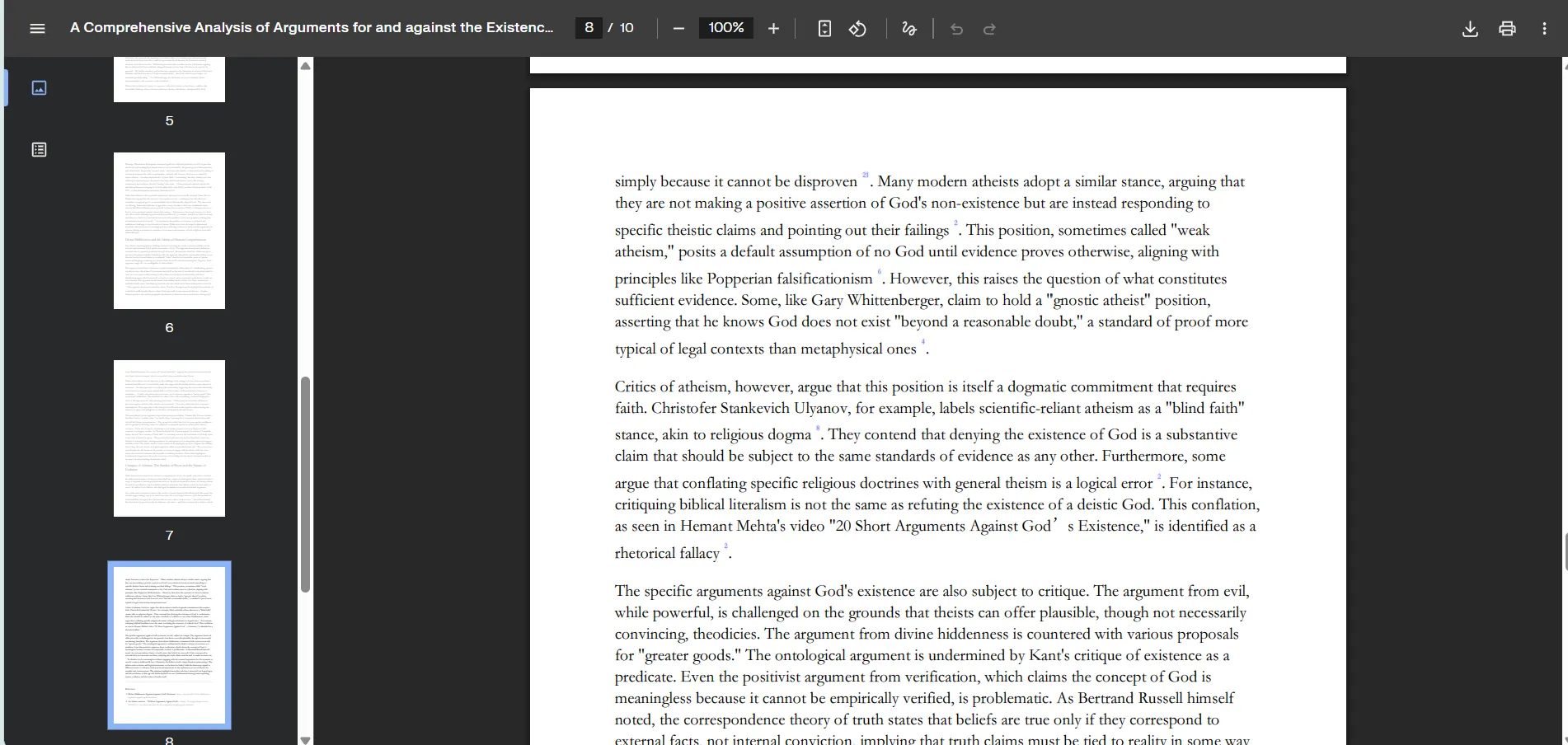
Here is a sample generated by Qwen: “One of the most controversial issues is the burden of proof. Bertrand Russell illustrated this with his famous teapot analogy: just as he cannot prove there is not a tiny teapot orbiting the sun between Earth and Mars, he believes theists likewise cannot prove that God truly exists.”
Other models do not delve as deeply into the burden of proof debate, as it may not be a core issue. Gemini approaches this depth by thoroughly covering the argument from consciousness and the “theological gap” critique. ChatGPT includes practical arguments such as Pascal’s Wager and explores real-world impacts on ethics and policy. Grok is concise (about one-third the length of Qwen’s report) but adds a useful summary table.
Result: Qwen’s discussion is the most thorough.
Clarity: How is the research content presented?
Grok organizes arguments in concise tables by type (philosophical vs. scientific, pro vs. con). Its chapter divisions are clear: “Philosophical Arguments,” “Scientific Arguments,” “Unexpected Details,” allowing anyone to quickly browse.
ChatGPT uses many parenthetical explanations to make complex concepts easier to understand. For example: “If the existence of God is possible (i.e., logically coherent), then God must exist.” The “(i.e., logically coherent)” helps readers without a philosophy background understand.
Qwen and Gemini are more academic in style. Qwen organizes content with formal titles such as “Theistic Arguments: Cosmological and Teleological Foundations,” which, while precise, makes for a more challenging reading experience. Gemini uses Roman numeral numbering (I. Introduction, II. Philosophical Arguments), with a clear structure but requiring careful reading.
Both are aimed at rigorous researchers, while ChatGPT and Grok target a broader audience.
Result: ChatGPT presents information most clearly, with Grok second.
Source Diversity: Does the research cover diverse traditions, disciplines, and perspectives?
Qwen integrates technical philosophy (Kalam argument, principle of sufficient reason, modal S5 logic) with cutting-edge scientific debates (Big Bang singularity, quantum fluctuations, DNA function). It ensures understanding through specific explanations and provides background examples for positions and arguments.
For example, when explaining theistic arguments, Qwen constructs tables clearly listing the premises, critical viewpoints, and supporting scholars of core arguments.
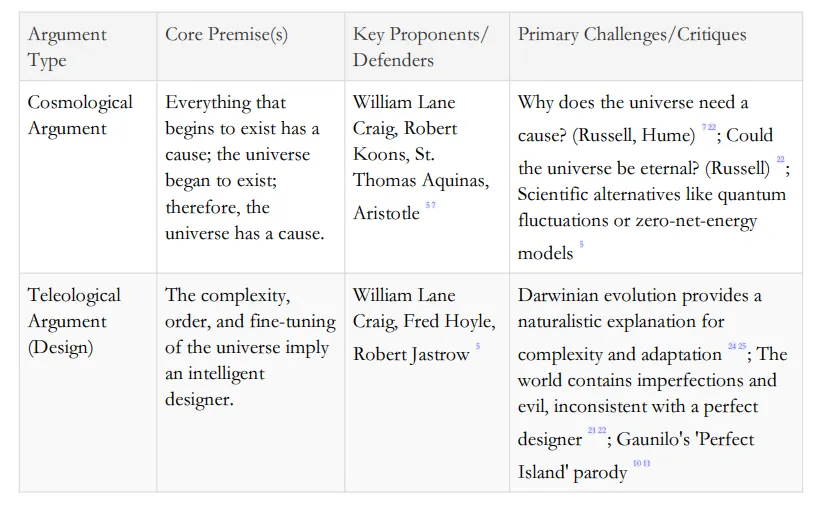
Gemini achieves the same level by covering the argument from consciousness, which most models overlook, and more explicitly warns of the reasoning flaws in the “theological gap.”
ChatGPT provides unique value with its large “real-world impact” section, exploring how the debate affects science education policy, bioethics regulations, and individual attitudes toward death. This section is less academic but more pragmatic, still relevant to understanding the nature of the research.
Grok covers the main arguments but lacks detail, mentioning fine-tuning and the anthropic principle but without specific figures or in-depth discussion.
Result: Qwen and Gemini perform best.
Overall Quality: Considering rigor, coherence, and academic value, which research would you be willing to cite?
Reports generated by Qwen and Gemini are both at a level suitable for submission to an academic advisor. Qwen’s unique advantage lies in balancing the depth of theistic arguments and atheistic critiques, including a burden of proof chapter. Gemini’s strength is in integrating scientific frontiers (consciousness, evolution, cosmology) with philosophical arguments.
ChatGPT has significant teaching value—very suitable for instruction or understanding real-world impacts. Grok can serve as a reliable introductory guide or quick reference.
In other words, if you just want to quickly acquire knowledge for conversation, show off your knowledge on a date, or refresh your memory before presenting on a familiar topic, ChatGPT and Grok may be more suitable.
Final Scores:
Qwen: 9/10
Gemini: 9/10
ChatGPT: 8/10
Grok: 6/10
Podcast Feature Showdown: Qwen vs. Gemini
Qwen’s podcast feature puts it in direct competition with Google NotebookLM and Gemini, pioneers in AI-generated audio summaries.
Unlike Gemini, Qwen offers a rich selection of anchor voices. Its structure is solid: two AI hosts engage in a real conversation about your research, rather than simply converting text to speech.
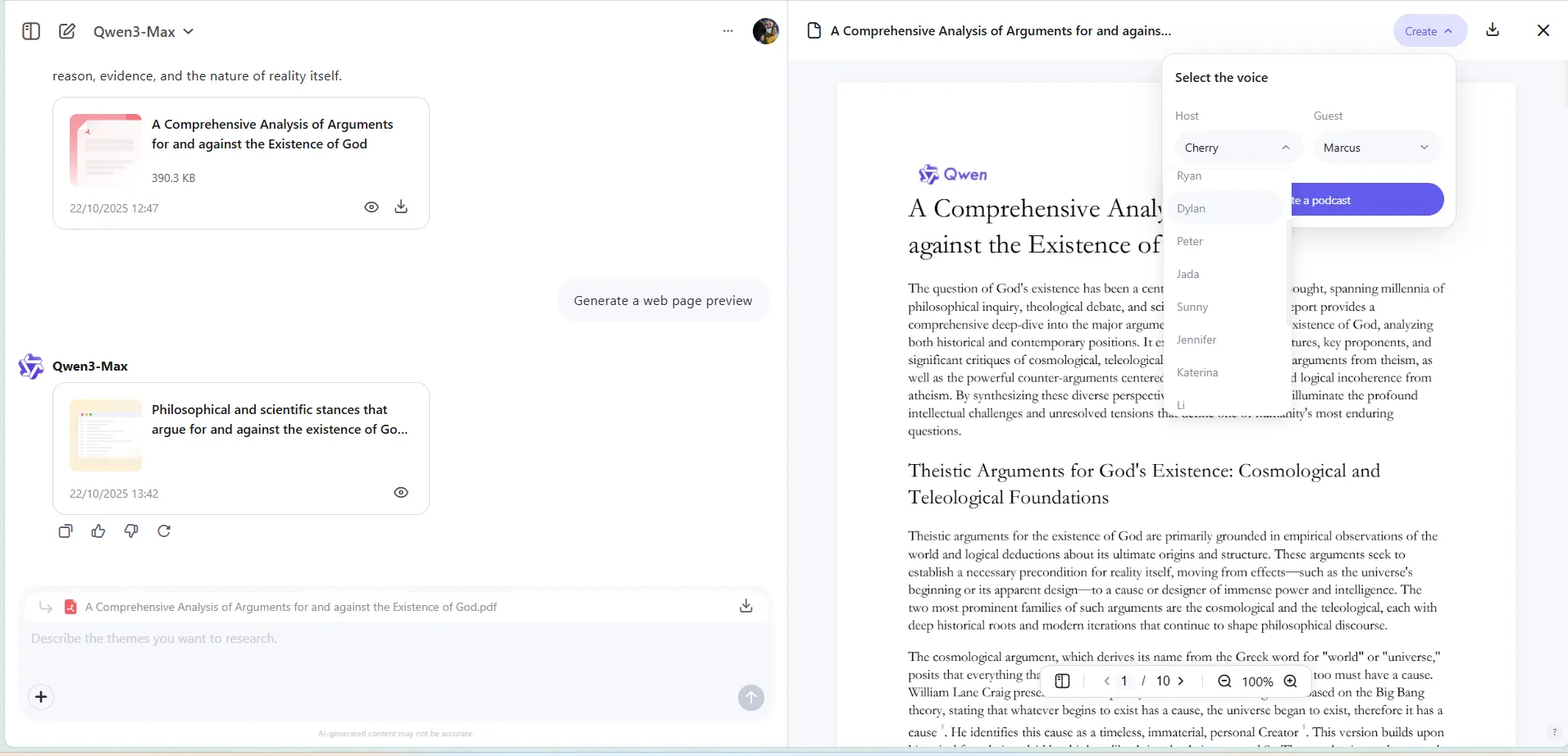
But audio quality is inconsistent: some voices sound natural, while most have a stiff robotic tone and strange accents. During testing, one male host kept exclaiming “oh oh oh” because he was “deeply moved,” prompting my wife to wonder if I was watching adult content.
With repeated trial and error, you can find a voice with acceptable fluency, at which point quality improves significantly.

However, Gemini and NotebookLM crush Qwen in this area. Google’s audio summary feature (introduced to NotebookLM in September 2024, expanded to Gemini in March 2025) displays astonishing human-like qualities, with natural speech patterns, engaging dialogue, and even humor.
Gemini’s podcasts are more human-like and engaging.
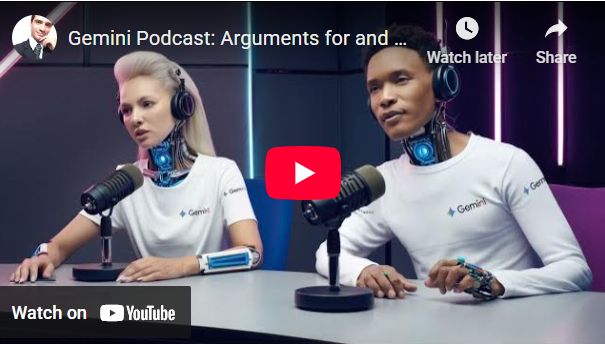
The platform also offers video generation, a significant advantage for users who prefer to understand topics through audiovisual means rather than reading long texts.
Qwen cannot achieve this—indeed, no other model can.
If you need a complete multimedia solution including audio, video, and webpages, Gemini is currently the most comprehensive choice.
Webpage Generation Advantage
Beyond research quality, Qwen’s killer feature is its auto-generated webpage function, unmatched by other models.
After research is completed, it can be converted into a real-time hosted website. Not a PDF or Google Doc—but a real webpage with titles, formatted tables, and embedded hyperlink citations.
The user interface is reminiscent of Kimi, with clear layout, responsive design, and instant sharing support.
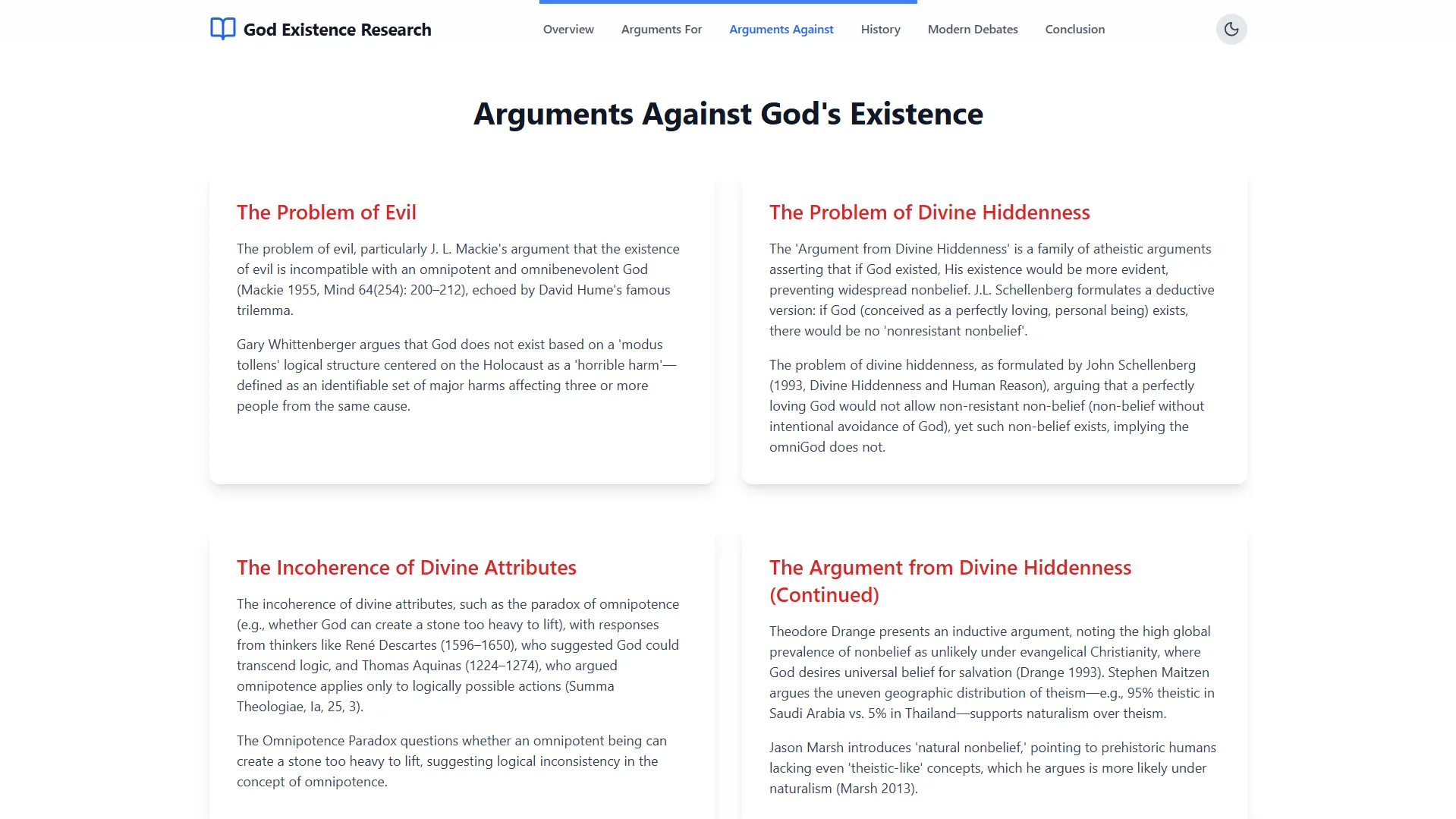
ChatGPT users need to manually copy and paste into a website builder.
Gemini keeps content in Docs. Grok outputs text only. Only Qwen can automatically generate webpage-ready output.
This kind of workflow advantage is truly the icing on the cake.